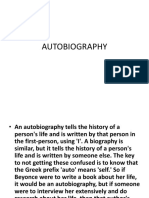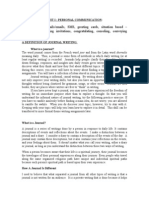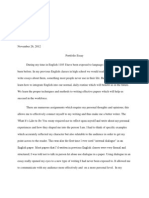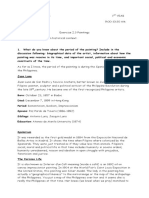0 ratings0% found this document useful (0 votes)
Exercise 1.3
Exercise 1.3
Uploaded by
Almavilla BantayanThe document discusses using a diary as a primary source for writing a life history. It notes that a diary is a form of autobiographical writing that records an individual's daily activities and reflections. As it is written privately for the author alone, a diary provides candidness unlike writing done for publication. A diary qualifies as a primary source because it contains a personally created account of one's own experiences, thoughts, and feelings, without commentary on outside events. The author loves writing about life events and keeping it private, so a diary provides a good personal perspective for a life history.
Copyright:
© All Rights Reserved
Available Formats
Download as DOCX, PDF, TXT or read online from Scribd
Download as docx, pdf, or txt
Exercise 1.3
Exercise 1.3
Uploaded by
Almavilla Bantayan0 ratings0% found this document useful (0 votes)
The document discusses using a diary as a primary source for writing a life history. It notes that a diary is a form of autobiographical writing that records an individual's daily activities and reflections. As it is written privately for the author alone, a diary provides candidness unlike writing done for publication. A diary qualifies as a primary source because it contains a personally created account of one's own experiences, thoughts, and feelings, without commentary on outside events. The author loves writing about life events and keeping it private, so a diary provides a good personal perspective for a life history.
Copyright
© © All Rights Reserved
Available Formats
DOCX, PDF, TXT or read online from Scribd
Share this document
Did you find this document useful?
Is this content inappropriate?
The document discusses using a diary as a primary source for writing a life history. It notes that a diary is a form of autobiographical writing that records an individual's daily activities and reflections. As it is written privately for the author alone, a diary provides candidness unlike writing done for publication. A diary qualifies as a primary source because it contains a personally created account of one's own experiences, thoughts, and feelings, without commentary on outside events. The author loves writing about life events and keeping it private, so a diary provides a good personal perspective for a life history.
Copyright:
© All Rights Reserved
Available Formats
Download as DOCX, PDF, TXT or read online from Scribd
Download as docx, pdf, or txt
0 ratings0% found this document useful (0 votes)
Exercise 1.3
Exercise 1.3
Uploaded by
Almavilla BantayanThe document discusses using a diary as a primary source for writing a life history. It notes that a diary is a form of autobiographical writing that records an individual's daily activities and reflections. As it is written privately for the author alone, a diary provides candidness unlike writing done for publication. A diary qualifies as a primary source because it contains a personally created account of one's own experiences, thoughts, and feelings, without commentary on outside events. The author loves writing about life events and keeping it private, so a diary provides a good personal perspective for a life history.
Copyright:
© All Rights Reserved
Available Formats
Download as DOCX, PDF, TXT or read online from Scribd
Download as docx, pdf, or txt
You are on page 1/ 1
Name: Mary Heart T.
Bantayan Instructor: Renato Valdez
Exercises 1.3 My Primary Source
Using the examples of the primary sources in the module, give a primary source that can
be used in the writing of your life history. Discuss how it qualifies as a primary source.
I would use a diary in writing my life history, because it is a form of autobiographical
writing that is regularly kept record of the diarist’s activities and reflections. It is
written primarily for the writer’s use alone, the diary has frankness that is unlike writing,
done for publication. It is qualified as a primary source because you created your story
personally and originally. You can also include your experiences, thoughts, and/or feelings,
excluding comments on current events outside the direct experience. I love writing the
events in my life and I always wanted to keep it by myself. Diaries also provide a personal
angle on history that’s why I think that this is the best primary source for me that is
qualified to use in writing my life history.
You might also like
- Muhammad Fahruraji-1810117210017-Answer Questions About MemoirNo ratings yetMuhammad Fahruraji-1810117210017-Answer Questions About Memoir3 pages
- Final-Portfolio For English 1010 Beatriz QuirozNo ratings yetFinal-Portfolio For English 1010 Beatriz Quiroz19 pages
- Birch Ellis - ENG 101 Mid-Term Writing_ Reflective Cover Letter Draft (1)No ratings yetBirch Ellis - ENG 101 Mid-Term Writing_ Reflective Cover Letter Draft (1)1 page
- 8 Types of CNF and Personal Essay AutosavedNo ratings yet8 Types of CNF and Personal Essay Autosaved18 pages
- Pharmacy's Students Should Write Both in Scientific and Non Scientific Type Because 2.there Are Four Main Types of WritingNo ratings yetPharmacy's Students Should Write Both in Scientific and Non Scientific Type Because 2.there Are Four Main Types of Writing5 pages
- 8A Unit One Unit Activity - Task One - 2022 2No ratings yet8A Unit One Unit Activity - Task One - 2022 22 pages
- Professor Rand'S Guide To Writing A PrécisNo ratings yetProfessor Rand'S Guide To Writing A Précis1 page
- Story of A Real Person's Life Written by Someone: Autobiography Gives As BiographyNo ratings yetStory of A Real Person's Life Written by Someone: Autobiography Gives As Biography3 pages
- Active Reading Assignment Template .... 1No ratings yetActive Reading Assignment Template .... 112 pages
- From Thoughts To Written Words: Learn To Journal From The SoulFrom EverandFrom Thoughts To Written Words: Learn To Journal From The SoulNo ratings yet
- Nyla Ngofas Introduction To Studio - Week 2 Assignment 1No ratings yetNyla Ngofas Introduction To Studio - Week 2 Assignment 15 pages
- How Do You Write A Thesis Statement For An Autobiography100% (2)How Do You Write A Thesis Statement For An Autobiography7 pages
- Purposive Communication: Instructress: Lyn B. AyopNo ratings yetPurposive Communication: Instructress: Lyn B. Ayop25 pages
- Purposive Communication: Instructress: Lyn B. AyopNo ratings yetPurposive Communication: Instructress: Lyn B. Ayop26 pages
- Purposive Communication: Instructress: Lyn B. Ayop100% (1)Purposive Communication: Instructress: Lyn B. Ayop24 pages
- Purposive Communication: Instructress: Lyn B. AyopNo ratings yetPurposive Communication: Instructress: Lyn B. Ayop36 pages













































































